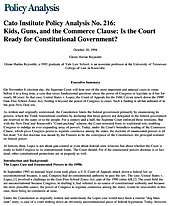As written and originally understood, the Constitution limits the federal government primarily by enumerating its powers, which the Tenth Amendment confirms by declaring that those powers not delegated to the federal government are reserved to the states or to the people. For a century and a half, the Supreme Court enforced those restraints. But with the New Deal and Roosevelt’s “Court-packing” scheme, the Court retreated from its traditional role, enabling Congress to indulge an ever-expanding array of powers. Today, under the Court’s boundless reading of the Commerce Clause, which gives Congress power to regulate commerce among the states, the doctrine of enumerated powers is all but dead. Yet that doctrine was meant by the Framers to be the centerpiece of the Constitution, the principal restraint on federal power.
At bottom, then, Lopez is not about gun control or even about federal-state relations but about whether the Court is ready to hold Congress to its constitutional limits. The Court should. For if the enumerated powers doctrine is in fact dead, other constitutional protections are in jeopardy as well.

